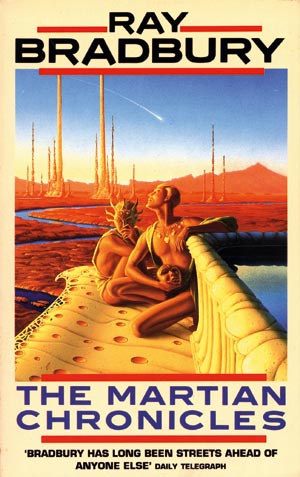Ray Bradbury: The Martian Chronicles
 I had already read The Martian Chronicles as a teenager but I didn’t remember that this was such a good book. It’s often very beautiful, it’s always very melancholic, and there’s a typical, archetypal Americanness in it which I adore and admire: the hope or belief that even if you screw up everything a thousand times, you still try it once more and can still belief that this time you’re going to make it. Of course, this is a sweeping generalization (as usual), but I don’t think any other nation can boast a literature with quite the number of infinitely confident, stubborn, often aggressive, and always curious characters and heroes that you can find in American literature.
I had already read The Martian Chronicles as a teenager but I didn’t remember that this was such a good book. It’s often very beautiful, it’s always very melancholic, and there’s a typical, archetypal Americanness in it which I adore and admire: the hope or belief that even if you screw up everything a thousand times, you still try it once more and can still belief that this time you’re going to make it. Of course, this is a sweeping generalization (as usual), but I don’t think any other nation can boast a literature with quite the number of infinitely confident, stubborn, often aggressive, and always curious characters and heroes that you can find in American literature.
Bradbury also writes about such characters in this book, which is the chronicle of the first periods of Martial colonization. The short stories (which are sometimes not real stories per se, rather, the retelling of other writers’ stories, or short, highly atmospheric still lives) tell us about the way humans go about colonizing Mars: the first couple of expeditions end in failure; then the next one ends successfully; then the colonists need to find their place among the ruins of an alien civilization which was left behind by the natives; and then after a while humans settle down in their new empire, with more and more people arriving from Earth – and then life on Mars slowly starts to resemble life „upon the dull Earth”.
In stories like this, there’s a whole lot of sadness both on the sides of the colonizers and the ones who are being colonized. Among other things, The Martian Chronicles is good because Bradbury deals with the situation of both the colonizers and the colonized (meanwhile shamelessly and wonderfully abusing your empathy and sensitivity): in the first couple of stories, which deal with the first unsuccessful Martian expeditions, it’s obvious that he takes the sides of the Martian natives and he depicts them as „positive” characters, and I honestly wish them all the success in their attempts to save their civilization, and I wish they would be strong and resourceful enough to get rid of all those strange, loud, aggressive, ridiculously self-absorbed earthlings who happens to land on their planet.
And then, later on, I tend to side with the humans, and I admire them greatly, because they never give up, they dare to change, they dare to start off on new adventures, and they are armed with the miraculous ability that they can make a new home for themselves anywhere in the whole wide world. (Obviously, that’s another question that the earthlings, intent on colonizing Mars cannot actually give up on their quest, since they managed to make such a ruin of their own planet that it’s imperative that they find a new dwelling-place instead of their old homes. And that’s also another question that the changes they make mostly relate to the surface only, and not to the core; and making a new home basically means that they force their new environment to conform to their old standards, while they don’t have the slightest inclination to adapt to their new circumstances.
Bradbury certainly gives you enough to ponder and moralize about the way humans behave in and with their own environment, and the environment they „discover” for themselves. And there’s enough in this book to feel sad about, even though I feel that Bradbury has a basically positive opinion about humankind: it seems to me that, for Bradbury, all the pathetic failures, and the weakness, and the cruelty are somehow much less important than the human ability to try everything again. And once again.





